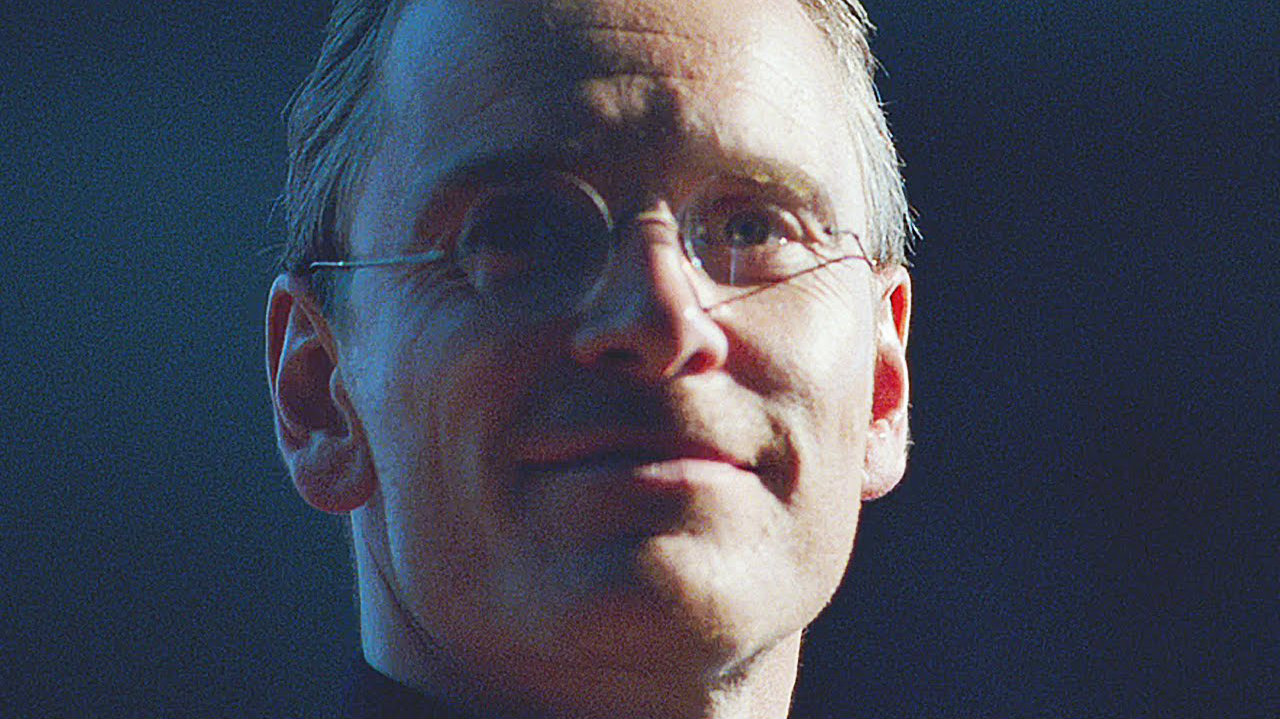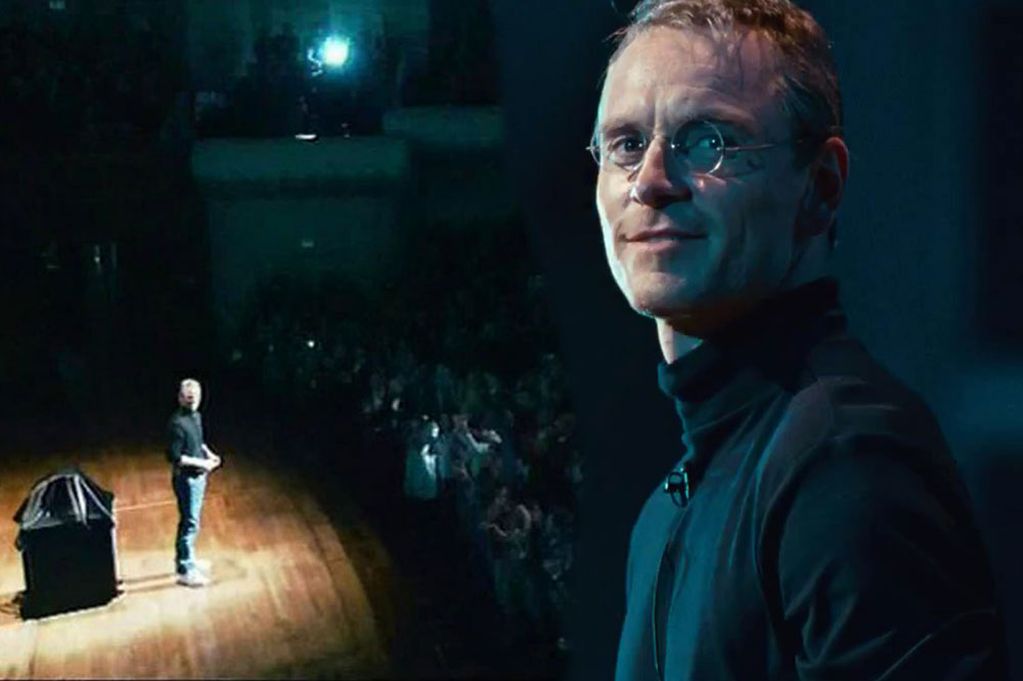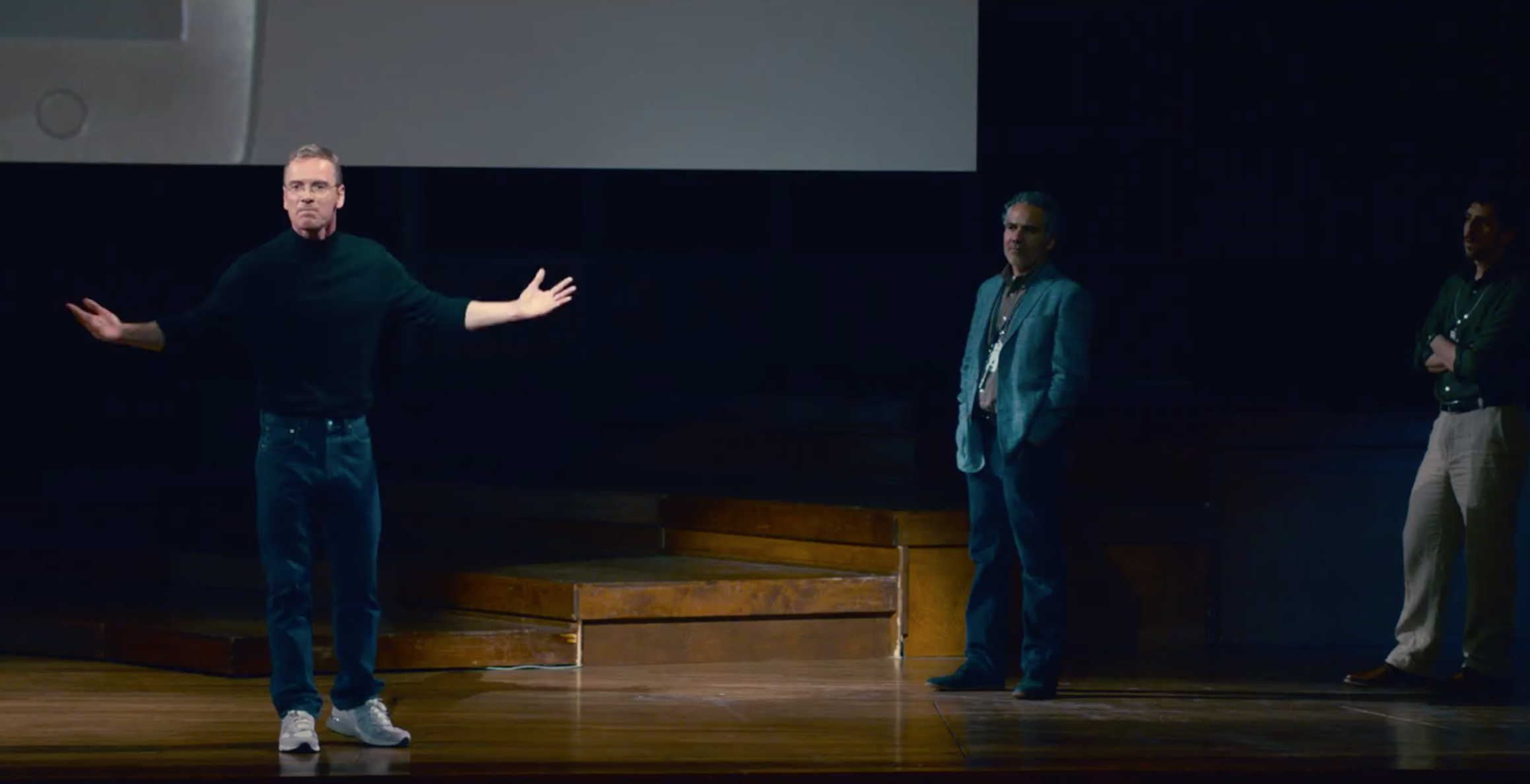Let's be straight: Steve Jobs shouldn't have worked as a movie. The setup is fully experimental, all talking from start to finish; Michael Fassbender doesn't look a thing like Jobs; it's loaded with geekspeak, even for a movie about the most famous man in personal computing history. Also, its protagonist shows every sign of being an antihero, and as a culture, we're kind of over antiheroes.
 Universal Pictures
Universal PicturesI'm giving it three stars because I think, at the end of the movie, it could have been better at everything it tries to do.
But it does work, and I'm still not sure why.
Certainly the cast has something to do with it. Besides Fassbender, there's Seth Rogen as Steve Wozniak, Jobs' Apple co-founder; Kate Winslet as Joanna Hoffman, Jobs' right-hand (wo)man; Jeff Daniels as John Sculley, Apple's erstwhile CEO; and the truly excellent Michael Stuhlbarg as Andy Hertfeld, the chief engineer at Apple. And Danny Boyle directs—the man behind everything from 28 Days Later to Slumdog Millionaire and more.
But the real reason this movie exists is the screenwriter: Aaron Sorkin, whose fingerprints are all over the whole thing. That's both its selling point and its downfall. Everything that's vintage Sorkin is here, from the walk-and-talks and the fast specialist patter to the overtly moralistic ending. The story takes place in three acts, each of which happens behind the scenes of a product launch: the Macintosh, the NeXT computer, and then the iMac, after Jobs' triumphant return to Apple following his ouster. It's truly behind the scenes—all we get is the backstage interactions, imagined and filtered through Sorkin's mind. The three-act structure is so classic it's almost Shakespearean, potentially better than theater, and the filmmakers concocted the idea of shooting each act in different film stock befitting its era, so the breaks are distinctive and striking.
That theatrical feel calls to mind last year's Birdman, a movie that had—without giving a lot away—some similar plot points and pretensions (down to the rebellious neglected daughter and the comedian-turned-dramatic-sidekick). The difference is that while Birdman's protagonist was suffering on behalf of his art, Steve Jobs visibly suffers on behalf of his “art,” something that is more obviously painted as both noble and ludicrous by its filmmakers. In short, Steve Jobs gives us the antihero in his full resplendence, not hiding his terribleness from us, and barely getting to his redemption before it's over—but then, we're all carrying around little Apple devices, right? So we're part of the story, too.
 Universal Pictures
Universal PicturesAll this means that invariably, Steve Jobs has a lot of the same problems as its spiritual predecessor, The Social Network, a.k.a. “the movie about Facebook,” also written by Sorkin. Masquerading as a biopic, The Social Network actually told a fact-altered version of Mark Zuckerberg's brainchild, playing with facts for a better story that's ultimately about whether a person can be a genius and also have friends.
Steve Jobs is in some sense the same movie. It's based on the Jobs biography by Walter Isaacson, and at the Q&A following the first press screening in New York, Isaacson was present. He contended that his book is really, at its core, about whether it's possible to be a genius and also be a good person. In our world, do we give geniuses a free pass? Do we assume that crazy-abnormal smartness absolves or at least excuses a person from having to act like a decent human being?
The movie asks this too, sometimes a bit ham-fistedly, especially in the final act. But it's a question worth asking. Can you be great, and good? Can you be the smartest guy in the room and still kind, generous, humble? Will history even remember you?
Part of the reason this is so interesting is that Sorkin's entire body of work as a writer has been on this topic, from the much-maligned (often rightly) The Newsroom all the way back to A Few Good Men, and Sports Night and Studio 60 and Charlie Wilson's War and the crowning jewel, The West Wing. Since the early 1990s, Sorkin has been writing stories about underdogs who are the best at what they do but have to figure out if they need to sacrifice their morals to move from third place to first, or to get recognition from their peers, or to win an election, or whatever. They're always great at their jobs; they're just up against moral difficulties.
To be honest, I've been wondering about this question my whole adult life. I have felt—as you may have—wildly let down by many of my heroes (including church leaders and theologians) as I discover them to be mean-spirited, lacking in moral courage, small-minded, and sometimes just generally horrible. (And let's be honest, social media has not helped in this regard.)
 Universal Pictures
Universal PicturesPerhaps the best answer I've stumbled upon was this summer, after I saw Love & Mercy, which told the story of the Beach Boys' Brian Wilson, certainly a troubled man. But, after seeing the film, my husband and I located the unedited recording session from Pet Sounds–the period of the band's history most covered and most legendary in music history—and we were delighted to hear a young Wilson as a relentlessly perfectionist, but incredibly encouraging, kind, celebratory artist. He made people feel special, and then challenged them to greatness, and Love & Mercy shows, richly, that kindness and good ideas (even genius) are not mutually exclusive. I'll be honest: this is a lesson I need to learn, and something I yearn to see from my heroes, especially the Christian ones.
Steve Jobs gives us that question and doesn't try to answer it. But even though it drags at times and leans too hard on its conceit, Steve Jobs is a must-see, and it might be the movie that captures our cultural pathologies in a raw, naked way I haven't seen onscreen in a long time. As a technical achievement, it's interesting, if not perfect. But for a story of our time, I can't imagine anything better.
Sometimes, this movie is a mess. See it anyway. It might blow your mind.
Caveat Spectator
The only thing Steve Jobs features that got it its R rating is a load of bad language, all types, including f-bombs used as adjectives, adverbs, actual verbs, and exclamations. Also, a major plot point includes Jobs' reluctance to acknowledge his paternity of his daughter. History suggests he was on the wrong side. I'm not here to judge.
Alissa Wilkinson is Christianity Today's chief film critic and an assistant professor of English and humanities at The King's College in New York City. She tweets at @alissamarie.












